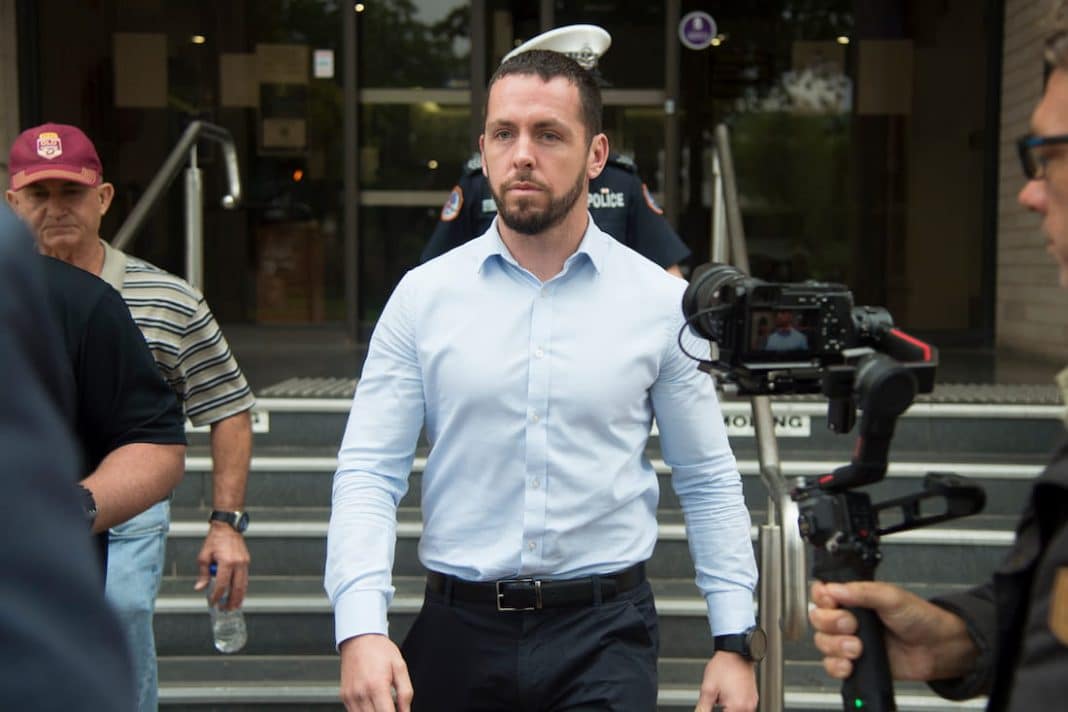An inquest into an Indigenous man’s shooting death was not supposed to be a royal commission into the actions of the exonerated Northern Territory policeman who pulled the trigger.
But after three months of hearings some insiders are questioning whether the inquiry has become too focused on the officer.
Others have heaped praise on the robust examination and say the shocking evidence needs to be revealed so a traumatised outback community can heal.
Constable Zachary Rolfe shot Kumanjayi Walker, 19, three times during a botched arrest against orders in Yuendumu, northwest of Alice Springs, on November 9, 2019.
The 31-year-old was charged with murder over the shooting, which happened as he and another policeman tried to handcuff the Warlpiri man for fleeing an alcohol rehabilitation clinic.
He was acquitted in March by a jury with no Indigenous members after a high-profile five-week trial that ignited grief and anger in the community, where some condemned the justice system as racist.
Others looked to the future and hoped the Alice Springs coronial inquest that started in early September would hear their voices and provide truths the trial didn’t.
Counsel assisting the coroner Peggy Dwyer promised the inquiry, which wrapped up for the year on Wednesday, would not be a “roving royal commission” into Const Rolfe and would instead focus on the NT Police Force response.
But after more than 50 witnesses and 50 sitting days, some in the legal profession are questioning the inquiry’s value, saying there is too much focus on the officer and the millions of dollars it’s costing could be better spent providing services to impoverished Yuendumu.
Others are happy Const Rolfe has been placed under the microscope and question why the evidence, such as his racist text messages and heavy-handed tactics, weren’t heard at the murder trial.
Mr Walker’s cousin, Samara Fernandez-Brown, agrees there has been a strong focus on Const Rolfe and that he is “an example of what is occurring and accepted amongst the police force and judicial industry”.
“At its core the inquest is a process to improve the current systematic failures amongst all of these institutions. A core of these systems is the police force and its racism which has been proven in this inquest,” she says.
“A lot of trauma and community healing comes from accountability against those who abuse their powers and are racist. This needs to be revealed and that’s what this inquest is doing.
“We continually want more transparency because we need to see results so this never happens again.”
NT Police Commissioner Jamie Chalker has described the inquest, which has heard damning evidence about the force’s culture and systemic failures, as “a search for truth”.
“There’s been a fair bit of mischief in the past; this is an opportunity for that to come out,” he told ABC News earlier in the week.
Some of that so-called mischief is undoubtedly Const Rolfe’s actions while he was stationed at Alice Springs Police Station in the lead-up to Mr Walker’s death.
The coroner has heard he sent and received “blatantly” racist, sexist and homophobic text messages during conversations with other officers.
Some described Aboriginal people as “c**ns”, “grubby f**ks”, “n*****s” and “Neanderthals who drink too much”.
It has also been revealed that the former soldier turned policeman was banned from applying to join the Queensland Police Force for a decade for failing to disclose on his written application that he’d been fined for being a “public nuisance” and for “violent behaviour”.
Const Rolfe’s application to the NT police has also been investigated, with the inquest told he also failed to disclose that he’d pleaded guilty to stealing while he was a soldier in the Australian Defence Force in 2012.
Details about his psychological assessment during the process, which were included in the coroner’s judgment rejecting the officer’s application to have evidence about him ruled inadmissible, highlighted relationship difficulties between Const Rolfe and his father, Richard Rolfe.
The written decision also disclosed that Const Rolfe had an above-average aggression score and could “brush off the significance of the error, seek to minimise his own role or to blame others”.
In addition to examining Const Rolfe’s recruitment, the inquest is probing his training and supervision on the job and his health issues, including his use of a prescribed medication that may “have impacted his capacity for behavioural inhibition to threat”.
Dr Dwyer has also called Const Rolfe’s former fiancee Claudia Campagnaro to give evidence about the couple’s relationship.
She told police after the news broke about Mr Walker’s shooting she wasn’t surprised to hear it was Const Rolfe who had pulled the trigger.
She said his goal when they were together was to join the Australian Defence Force’s Special Air Service regiment so he could “be paid to go out and shoot people”.
Const Rolfe has also gone into the witness box but he refused to answer all Dr Dwyer’s questions over fears it could lead to further NT police disciplinary action against him.
Whether he can continue to claim penalty privilege or will be compelled to answer the uncomfortable questions about the night he killed Mr Walker, and racist text messages, when the inquest resumes in February will decided by the Supreme Court in the next week.
If the coroner can legally force Const Rolfe to give evidence he’s likely to be asked about his robust policing style, which led to several suspects and offenders being injured and multiple internal investigations into his use of force.
Dr Dwyer declined to answer questions about the inquest’s focus on Const Rolfe and AAP was instead pointed to the broader issues the inquiry is considering, including the militarisation of the NT police force, health services in Yuendumu and Mr Walker’s early life and the difficulties he faced.
The inquest continues on February 27.


